Unsettle
[ən-ˈse-tᵊl] verb
to loosen or move from a settled state or condition : make unstable : DISORDER : to perturb or agitate mentally or emotionally : DISCOMPOSE
JD Pluecker’s original discipline is language: vignettes, poetry, critical art writing, and translation. In 2018 they began a studio practice as another language — a way of working in which “objects would function as a kind of proxy for language.” They told me, “I am a writer who uses objects in spaces as a way to write, as a way to research.” The above image captures this: this overturned tea pot with rebar carefully balanced atop is certainly unsettled. Zooming out, the exhibition takes up the entirety of the gallery space. Pluecker painted on the floor, upon which they organized objects into groupings, and hung other objects on the wall and from the ceiling. No object or grouping of objects is titled; every component in the Unsettlements relates to either their biological or chosen family. Before Unsettlements: Moms came Unsettlements: Dads, which debuted at Lawndale in Houston in the 2018/2019 Artist Studio Program Exhibition. This exhibition at Texas State Galleries is the second iteration of Moms, in which Pluecker further explores their relationships with their dyke mom Linda, their biological mom Claire, and their godmother Barbara Ann.
We express a significant portion of gender and sexuality through language. Pluecker moves through the world readdressing and reorienting, willing to deconstruct experience and desire that is at the complex intersection of sexuality and gender identity. They allude to the proverbial closet with this embroidered doorstop, which their godmother Barbara Ann helped them make.
Out of that same willingness to disorient themselves, Pluecker’s work deals heavily with identifying and criticizing colonization. The title of the exhibition nods to this — to unsettle as opposed to settle Texas. As the descendant of German immigrants who came to Texas in the 19th century, they recognize the role their family has played in colonizing this land and enforcing racial hierarchies. They answer to this history with a dismantled rope, which may no longer be used for lynching.
A few of the objects on the floor relate to their biological mother, father, and godmother. Some of these objects directly passed through their hands, while others Pluecker picked up from one of 17 sites of significance for their family around Texas: more personal for their father Tom, more ancestral for their mother Claire. They made multiple trips to these sites, putting put their body in these spaces, reflecting, choosing objects, and taking field recordings. The objects then become the vernacular for their installations.
Then, after the objects have served their purpose, Pluecker will pack them into their car, drive to the site from where they came, and return them. It is a poetic action meant to find meaning in the reciprocal relationship they build with the objects. They reject collecting because collecting is a colonizing action, and these objects have lives.
Pluecker refuses pedestals in this exhibition because they evoke veneration of white supremacist historical figures. Instead, they lay their objects down in beds of flowers — well, not exactly. Pluecker has placed wide, brown marks on the floor that represent rhizome root systems, much like the ones formed by begonias. Begonias are important to Pluecker’s biological father, Tom–Tom, who inherited an heirloom begonia from his own mother and has since shared the plant’s offspring with his family members. Pluecker is interested in the history of this plant, which is named after Michel Bégon, a Frenchman who administrated the slave trade in Haiti in the 17th century. However, the root system of the begonia has been taken up by French philosophers Gilles Deleuze and Félix Guattari to discuss non-hierarchical approaches to theory and research. Contrary to a tree with a deep root system — like those often used to illustrate a family tree — which describes binary and hierarchy, the planar way in which the begonia grows allows for multiple interpretations and influences. Pluecker uses these for a subversive interpretation, by depicting rhizomatic root systems beneath the installations of their objects.
Interspersed with objects relating to Pluecker’s biological family are objects belonging or relating to Linda L. Anderson, whom Pluecker refers to as their dyke mom. Pluecker and Anderson met in 1997 at Yale University, where Anderson worked as an administrative assistant in the Women’s and Gender Studies program and organized with feminist, lesbian, and labor groups inside and outside of work. Pluecker graduated from Yale in 2000 and both Anderson and Pluecker have been a support system for each other since meeting.
On the floor of this exhibition, Pluecker laid books from Anderson’s archive; on the wall they hung drawings, based on the contents of Anderson’s journals; and from the ceiling they hung multiple art objects, also based on drawings from Anderson’s journals. “Don’t panic,” one embroidery reads. For this object, Pluecker spelled out these words by couching segments of the aforementioned dismantled rope with magenta thread onto an off-white, frayed piece of fabric. The color of the thread in this instance is of little importance to the artist — they are colorblind.
The large design made of leaves and petals tacked to the wall is an iteration of a drawing from Anderson’s journals, as well. A meandering line of green leaves bifurcates a large circle of red petals, terminating in a pile of flowers on the floor. It looks geographical, in the loose way hand-drawn maps depict the Earth’s features. This is a design Anderson used to describe the sexual pleasure she shared with a lover. A sketch of this journal entry hangs on the wall left of the installed design. Pluecker reiterating Anderson’s artwork and writing is a metaphor for continuing the work of queer liberation, intergenerationally.
These installations are not for creating marketable art objects with titles. Rather, these are environments in which to spark and hold conversations. Pluecker is interested in the relational, the betweenness of their own life and relationships. This exhibition is about the people important to them and the conversations that they might have in the gallery space. All three of the artist’s mothers attended the opening of this exhibition. If we must choose for whom we create, JD Pluecker chooses the ones they love.
Unsettlements: Moms is on view at Texas State Galleries in San Marcos through November 7, 2023.


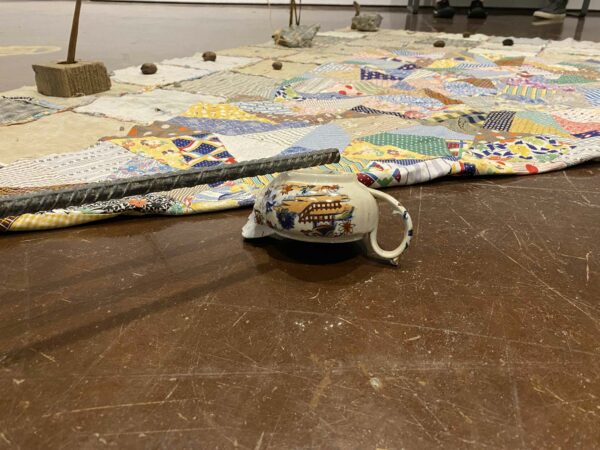
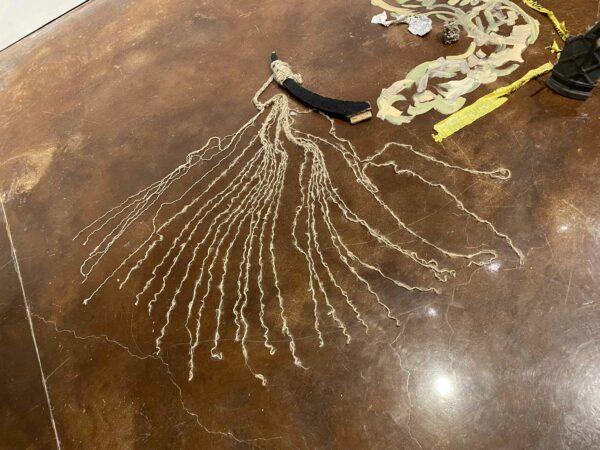
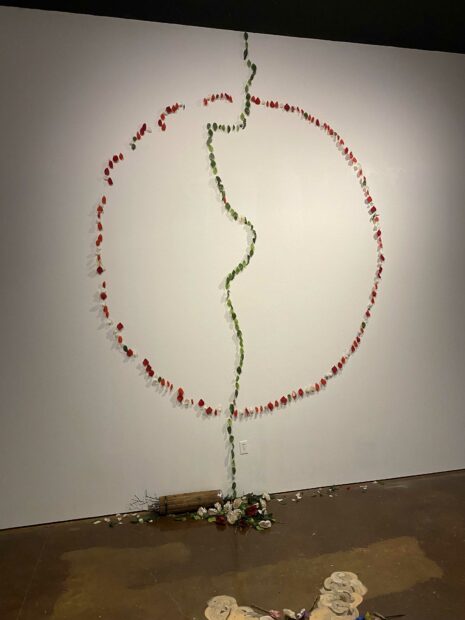
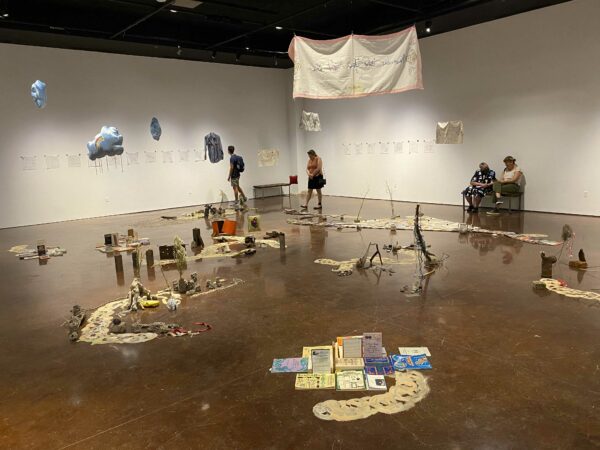
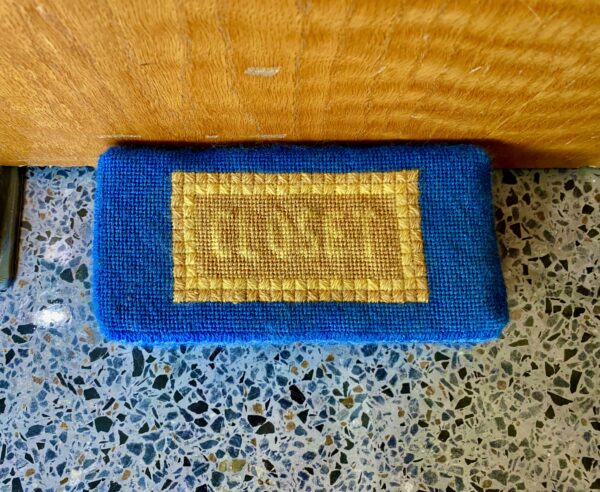
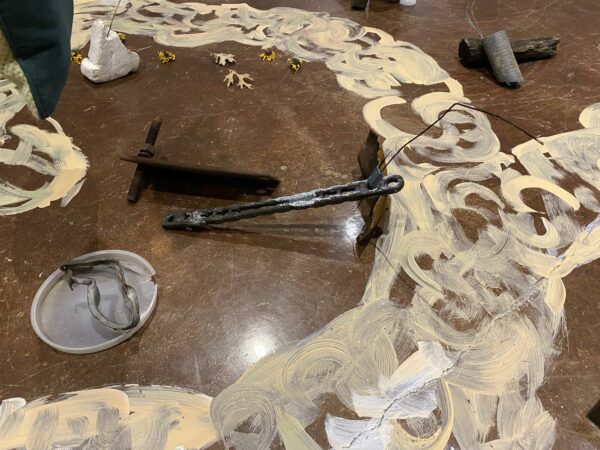

1 comment
Wow.